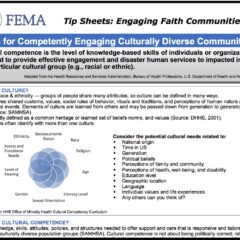Building religious literacy and competency is an ongoing process, with a wealth of self-directed study resources as well as classroom training available. A good starting point is taking a religious literacy self-assessment quiz and then proceeding to self-study with a focus on the religious traditions you work with. Smartphone apps are available for use in the field when scheduling meetings and for locating culturally-appropriate food vendors.
National Disaster Interfaiths Network and USC Center for Religion and Civic Culture Resources
Tip Sheets:
NDIN’s Disaster Tip Sheets for U.S. Religious Leaders have been developed to assist religious leaders in any community. Appropriate for any faith tradition, they address all-hazards planning and cover topics from across the entire disaster lifecycle, such as how they and/or their house of worship can respond to crises, including how to coordinate volunteers, manage donations, provide mass care, attend to spiritual and mental health needs, and continue their many services post-disaster.
Disaster Tip Sheets for Faith Community Partners are provided to inform religious literacy, cultural competency and reasonable religious accommodation mandates for U.S. Mass Care providers, and to assist staff and volunteers in competently meeting the needs of several major religious groups during sheltering.
Field Guide:
Working with U.S. Faith Communities During Crises, Disasters and Public Health Emergencies. A Field Guide for Engagement, Partnership and Religious Competency is a detailed guide for engaging and building sustainable and competent partnerships with faith communities throughout the entire disaster lifecycle. The Field Guide provides suggestions, best practices, and guidance on how to approach the faith communities, religious leaders, and faith-based non-profits that make up this landscape to build durable, institutional relationships, and develop sustainable, faith-based emergency preparedness and response programs.
Primer:
Religious Literacy Primer: For Crises, Disasters, and Public Health Emergencies is a quick-reference document which provides information on basic religious literacy for 24 of the largest religious communities in the United States. It is geared toward enabling emergency managers, public health officials, first responders, volunteers, voluntary agencies, and anyone involved in disaster response and recovery to understand how faith communities and emergency management intersect. The Primer provides guidance for physical interaction/etiquette, drawings of religious symbols, information on holidays, dietary restrictions, and provision of post-disaster mass care including shelter, medical treatment, and mental health care.
Assess Your Own Level of Religious Literacy:
U.S. Religious Knowledge Quiz – Pew Forum for Religion and Public Life
Religious Literacy: What Every American Needs to Know—and Doesn’t – Stephen Prothero’s Religious Literacy Quiz
Web Resources for Religious Literacy and Competency
Pew Research, Religion and Public Life Project
Research and extensive U.S. religious landscape survey data.
Religious Congregations & Membership Study
Data files on hundreds of religion surveys and provides the ability to map U.S. congregation data for individual cities, states, and zipcodes.
Gallup Poll Topics and Trends
Provides survey data and reports on a number of religion trends in the United States.
Hartford Institute for Religion Research
Comprehensive list of online religion data resources.
The Tanenbaum Center
Resources including etiquette guides for addressing religious leaders and entering houses of worship.
University of Southern California Center for Religion and Civic Culture
Research / publications on religious trends in the U.S.
CLICK HERE TO SIGN UP FOR CRCC’S NEWSLETTER
Reports
A Local Official’s Guide to Working with Clergy and Congregations. Sacramento, CA: Institute for Local Government, 2010.
Farrag, Hebah, Brie Loskota, and Richard Flory. FAithful Action: Working with Religious Groups in Disaster Planning, Response and Recovery. Rep. Los Angeles: Center for Religion and Civic Culture, USC, 2012.
Hull, Pete. Heralding Unheard Voices: The Role of Faith-Based Organization and Nongovernmental Organizations during Disaster (final report), Homeland Security Institute, Prepared for the Department of Homeland Security Science and Technology Directorate, 2006.
Bridges, Dr. Diane. Culturally Sensitive Religious & Spiritual Care: Creating Resources (2004)
For more resources, including books and apps, please see the full PDF of the tip sheet:
Click here to download a PDF of this tip sheet.
The Engaging Faith Communities tip sheets were created through a collaboration between the DHS Center for Faith-based and Neighborhood Partnerships, the USC Center for Religion and Civic Culture, USC CREATE and the National Disaster Interfaiths Network. For further training, please see EMI course IS-505, which was also developed by this partnership.
